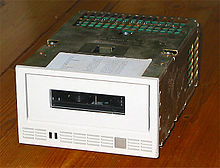- Data8
-
 8 mm Tape
8 mm Tape
The 8 mm Backup Format is a magnetic tape data storage format used in computer systems, pioneered by Exabyte Corporation. It is also known as Data8. Such systems can back up up to 40 GB of data depending on configuration. The tapes used are mechanically the same as the tapes used in 8 mm video format recorders and camcorders.
Until the advent of AIT, Exabyte were the sole vendor of 8 mm format tape drives. The company was formed with the aim of taking the 8 mm video format and making it suitable for data storage. They did so by building a reliable mechanism and data format that used the common 8 mm video tape technology that was available then. This was the first form of helical scan tape used commercially for data storage.
Exabyte's first 8 mm tape drive was made available in 1987. This was followed up with their Mammoth tape drive in 1996, and the Mammoth-2 (M2) in 1999.
Exabyte's drive mechanisms were frequently rebranded and integrated into UNIX systems.
Contents
Generations
NOTE: The AIT and VXA formats and some other less common formats also use 8 mm wide tape, but are completely incompatible.
Compatibility between tapes and drives and native capacities (GB)
MP AME AME w/ SmartClean 15 m 54 m 112 m 160 m 22 m 45 m 125 m 170 m 75 m 150 m 225 m EXB-8200 Y Y 2.4 EXB-8205 Y Y Y EXB-8205 XL Y Y Y Y EXB-8500 Y Y 5 EXB-8505 Y Y 5 EXB-8505 XL Y Y 5 7 EXB-8700 Y Y Y Y Eliant 820 Y Y 5 7 Mammoth (EXB-8900) RO RO RO RO 2.5 Y 14 20 Mammoth-LT RO RO RO RO 2.5 Y 14 Mammoth-2 6 12 33 45 20 40 60 Legend:
- RO - The tape drive can read this tape, but not write. (Read Only)
- Y - The tape drive can read and write this tape, but size is not known.
- Numbered entries indicate the native storage capacity (in GB) for this combination of tape and drive.
Exabyte 8 mm
These drives use Metal Particle (MP) tape.
- 1987 -- EXB-8200
- Full-Height form factor
- 246 kB/s data transfer rate
- EXB-8200SX model features high-speed search
- 1990 -- EXB-8500
- Full-Height form factor
- 500 kB/s data transfer rate
- EXB-8500c model features hardware data compression
- 1992 -- EXB-8505
- Half-Height form factor
- 1994 -- EXB-8505XL
- Half-Height form factor
- 500 kB/s data transfer rate
- 1995 -- EXB-8700
- Tabletop (top-loading) form factor
- 8700 model included generic backup software
- 8700LT model included no software
- 8700SW included Cheyenne backup software
- 1998 -- Eliant 820
- Half-Height form factor
Mammoth
These drives use Advanced Metal Evaporated (AME) tape, but could also read (but not write) MP tapes.
- 1996 -- EXB-8900 Mammoth
- 3 MB/s data transfer rate
- LCD on drive displayed drive status
- 1999 -- Mammoth-LT
- No LCD
Mammoth-2 (M2)
These drives used Advanced Metal Evaporated (AME) tape with an 2 m integrated cleaning tape header called Smart Clean.
- 1999 -- Mammoth-2
- 12 MB/s data transfer rate
- 4.6 cm/s tape speed during normal read/write operations
- 1.6 m/s tape speed during search and rewind operations
- 17 s load time, from insertion to ready
- ALDC hardware data compression, 1 kB compression buffer
See also
- Exabyte Corporation
- 8 mm video format
External links
- A brief history of tape according to Exabyte
- Much Ado About Exabyte
- Identifying MammothTape and 8 mm tape drives
- Mammoth-2 Product Specification
- Techinical details for several Data8 products
Standards
- ECMA-145 ISO/IEC 11319:1991 First specification for 8 mm tape data storage. [1]
- ECMA-169 ISO/IEC 12246:1993, Specification of DA-1 (dual azimuth extension). [2]
- ECMA-249 ISO/IEC 15757, Specification of DA-2 (MammothTape). [3]
- ECMA-293 ISO/IEC 18836, Specification of MammothTape-2. [4]
Magnetic tape data storage formats Linear Three quarter inch (19 mm) Half inch (12.7 mm) Eight millimeter (8 mm) Quarter inch (6.35 mm) "Eighth" (0.15) inch (3.81 mm) KC Standard, Compact Cassette (1975) · HP DC100 (1976) · Commodore Datasette (1977) · DECtapeII (1979)Stringy (1.58–1.9 mm) Helical Three quarter inch (19 mm) Half inch (12.7 mm) Eight millimeter (8 mm) Four millimeter (3.81 mm) DDS/DAT (1989)Categories:- Computer storage tape media
Wikimedia Foundation. 2010.

